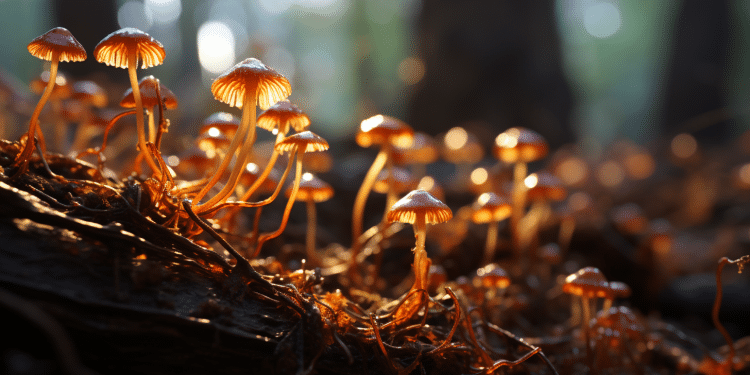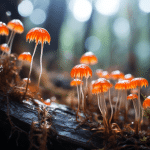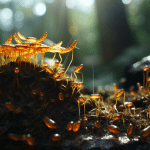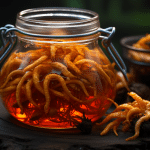According to an abundance of studies, cordyceps mushrooms appear to offer many benefits for those fighting cancer. We reviewed the latest cordyceps cancer clinical trials, so you do not have to, and here’s what we found.
Can You Use Cordyceps for Cancer?
Cordyceps mushrooms are among the healthiest mushrooms that people can include in their diet. They have well-documented health benefits, including anti-inflammatory activities, immune-boosting effects, and anti-cancer properties. While you should not take this alone as a cure for cancer, adding cordyceps to your diet may help you tackle cancer head-on. Cordycepin, a naturally occurring nucleoside found in the fungus cordyceps, has been used in Chinese medicine to treat cancer, along with chronic, inflammatory diseases, for centuries.
The recent scientific rediscovery of the natures medicines has led to the explosion of research on cordyceps for treating cancer. Even Oxford University has joined forces with a biopharmaceutical company, hoping to build cordyceps-based chemotherapy drugs. Cordyceps could potentially possess cancer-fighting and anti-metastasizing properties, according to clinical trials. The mushroom can also help your body heal itself after being stressed by chemotherapy and cancer medications.
Heres a evidence-based breakdown of how cordyceps mushrooms can fight off 12 types of cancer. We are going to cover data related to the more common types of cancers.
Cordyceps and Breast Cancer
Cordyceps sinensis can inhibit the growth of breast cancer. A study investigated the role of extracts from cordyceps in anti-cancer activities. Results showed that the mushrooms can slow down breast cancer tumor growth through decreased NF-kB inhibition. Another species of cordyceps, C. militaris, has amazing anti-tumor potential as well.
A 2019 study investigated the effectiveness of bioactive compounds found within cordyceps fruiting bodies. The results suggested the mushroom has a high potential for preventing breast cancer. Researchers reached similar conclusions in a 2013 study of the effects of cordyceps on breast cancer growth. The results suggested cordycepin, the active ingredient found in the mushroom, induces tumor growth delays in mice suffering from breast cancer.
Cordyceps and Ovarian Cancer
Cordyceps militaris has shown promise in treating ovarian cancer as well. A study from 2020 looked at this pharmacological mushrooms effects on SKOV-3 ovarian cancer cells. The results suggested cordyceps mushrooms induced apoptosis preventing the cancer from spreading.
Therefore, taking Cordyceps militaris can enhance the cell death of ovarian cancer cells. Another study investigated potential anti-cancer effects of Cordyceps against ovarian cancer that is resistant to carboplatin. Carboplatin is a chemotherapy drug used for treating several types of cancer.
Unfortunately, ovarian cancer cells can get resistant to this medication pretty quickly. Once this happens, the drug is no longer able to induce apoptosis and keep the tumor from spreading any further. The results from this study indicate that cordyceps militaris has similar anti-tumor effects as carboplatin through the activation of ATF3/TP53 pathways.
Cordyceps and Testicular Cancer
Cordyceps has shown a lot of potential for improving the production of testosterone. But, could it be useful for treating testicular cancer? Research seems to indicate that it does. Cordycepin, the active ingredient found in Cordyceps, has properties that may help treat testicular cancer.
A 2015 study investigated the effects of cordycepin on leydig tumor cells from the MA-10 mouse. The use of cordycepin caused the mouse’ Leydig cells to undergo apoptosis. Although further studies are needed, these results indicate that the compound may have utility in conjunction with anticancer drugs.
Cordyceps and Uterine Cervix Cancer
Research on the cordyceps sinensis suggests that the mushroom may have a clinical use for treating cervical cancers of the uterus. A 2014 study investigated the effects of the fermented fungus Cordyceps on cervical uterine cancers in mice. The results suggested that taking Cordyceps sinensis could enhance uterine cervical cancer treatment effectiveness, particularly when combined with selenium.
Cordyceps and Prostate Cancer
A study investigated the effects of cordycepin, a bioactive compound found in Cordyceps militaris, on prostate cancer cells. The results suggested cordycepin may be a potent inducer of apoptosis of prostate cancer cells. The compound also shows a lot of promise when it comes to slowing the metasis of human prostate cancer cells. One study looked at cordycepins antimetastatic effects on cell mobility and invasion capacity. Essentially, cancer cells must be able to migrate and attack other cells in order to spread to different parts of the body.
Cordycepin appears to inhibit both these actions, making it an excellent complement to conventional treatments for cancer.
Cordyceps and Colon Cancer
Cordyceps sinensis may hold amazing benefits when it comes to colon cancer. Polysaccharides, in particular, are showing great promise. A 2020 study investigated the cancer-fighting effects of polysaccharides found in cordyceps mushrooms on human colon cancer cell lines.
The results indicated that the polysaccharides obtained by water extraction increased the autophagy of these cells, simultaneously suppressing their growth. Cordyceps militaris also shows promise as a tool for treating colorectal cancer. One study looked at cordyceps potential inhibition effects in a cell line that was developed from a human colorectal tumor. Results showed that the cordyceps ethanol extract induces cell cycle arrest and apoptosis in human colorectal cancer cells.
Cordyceps and Gastric Cancer
Cordyceps may also possess some tumor-fighting properties. One study looked at the effects of this fungus, Cordyceps, on human gastric cancer cells. Researchers treated tumor cells with ethanolic extract from C. cicae for 48 hours. The extract appeared to induce apoptosis and arrest of cell cycles in cancer cells. These results seem promising and call for more studies of cordyceps effects in gastric cancer.
Cordyceps and Lung Cancer
Cordyceps for pulmonary health has been a mainstay of Chinese medicine for centuries. But did you know that research on cordyceps shows a lot of potential when it comes to using these mushrooms to treat lung cancer. For instance, one study from 2015 looked at the effects of Cordyceps militaris on non-small cell lung cancer.
A methanolic extract from cordyceps fruiting bodies appeared to decrease the growth of lung cancer, increasing levels of several tumor-suppressing proteins. Polysaccharides found in cordyceps sinensis seem also to have been a big help for treating lung cancer. One study looked at the effects of these compounds on lung cancer cells in vitro. The results showed polysaccharides suppressed the growth of the tumors and increased cytotoxicity in the lung cancer cells.
According to a 2009 study, taking cordyceps supplements could improve the recovery process after chemotherapy drugs were given in mice. Cordyceps sinensis appears to protect bone marrow stem cells from cytotoxic effects of the cancer drugs.
Can Cancer Patients Use Cordyceps Mushroom?
Cordyceps is not harmful to people with cancer. On the contrary, this mushroom may actually prove to be rather helpful for you when fighting against cancer, since it may possess an anti-cancer effect. Cordyceps may also provide an overall boost to immunity, so that you will recover from chemotherapy drugs more quickly.
Should You Try Cordyceps for Cancer?
While further studies are needed, cordyceps mushrooms are showing significant promise in the field of cancer therapy. Still, make sure you check with your health care provider, especially if you are going to be having surgery or undergoing treatment shortly.
Additional Resources:
Does Cordyceps Increase Your Energy Levels?
You can find our favorite capsules, powders, and tincture’s on the following pages of our website and learn more about each individually:
The Best Cordyceps Mushroom Gummies
Updated 10/14/2022.















